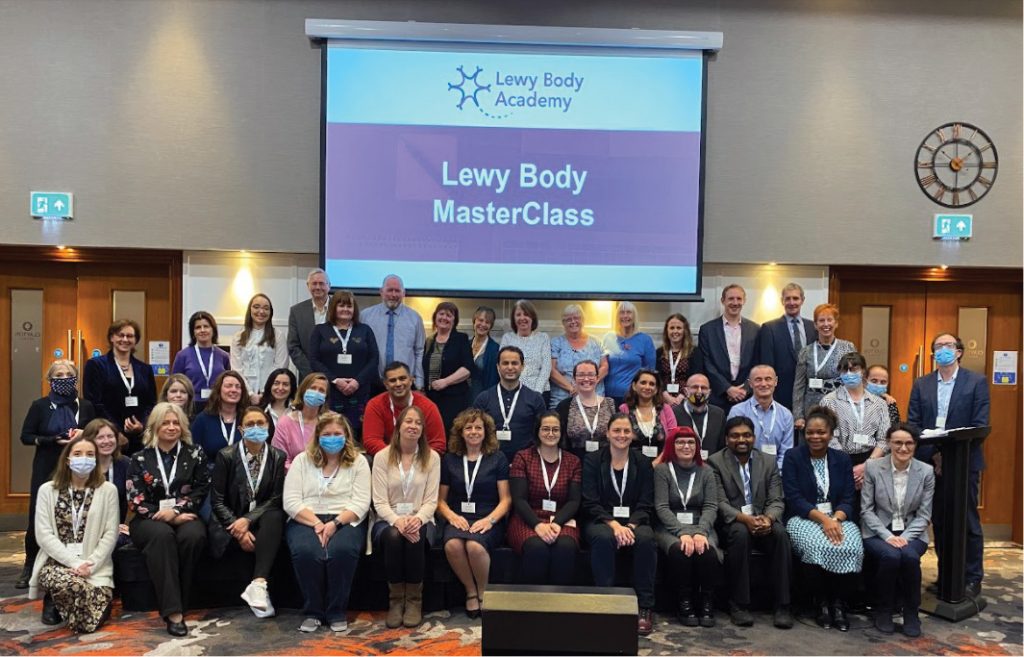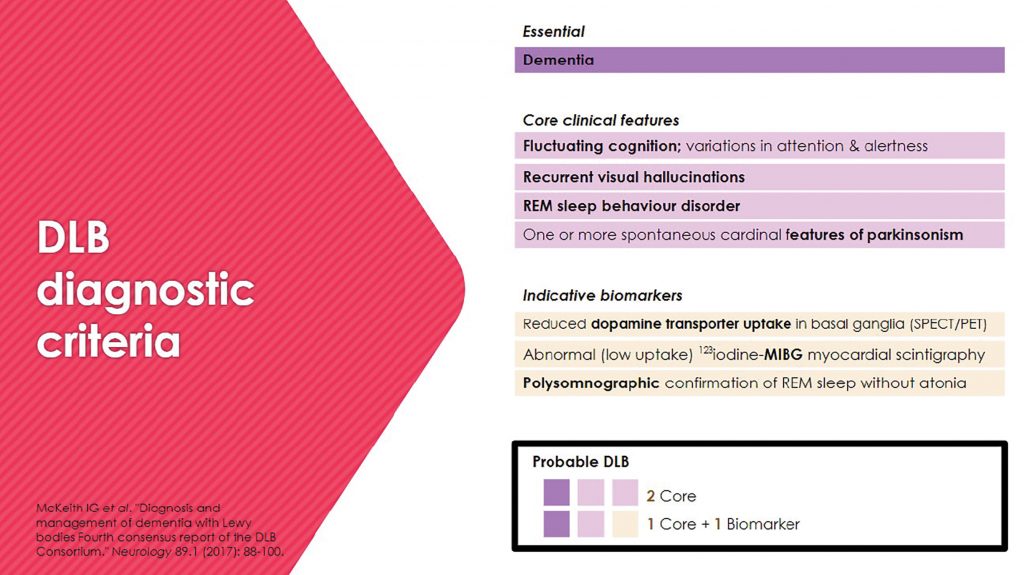On Thursday 4th November, experts in Lewy body dementia and a range of healthcare professionals keen to expand their understanding of the condition met in Belfast for the inaugural MasterClass of the new Lewy Body Academy. Part of Neurology Academy’s educational umbrella, the Lewy body MasterClass was offered over a full day with a networking dinner the preceding evening. The course was partially supported by an educational grant from the Lewy Body Society [1] and was delivered in collaboration with Lewy Body Ireland [2].
Meeting a need: Education in Lewy body dementia
Lewy body dementia (LBD) and Parkinson’s disease dementia (PDD) together account for up to 15% of all dementias. Recognition and management of these dementias, though, is often suboptimal, and people living with them can fall through the gaps in care. The cost of care of LBD is among the highest of all types of dementia, and the care burden is significant.
The urgent need to address the gap in awareness and clinical skills around the diagnosis and management of LBD by clinicians in the UK and Ireland prompted Professor Iracema Leroi, who founded Dementia Academy five years ago, to establish Lewy body Academy in partnership with an expert faculty and voluntary sector organisations. Its aim is to deliver bespoke education on dementia with Lewy bodies, improving detection, diagnosis, and management – and closing the gap in care.
The MasterClass
The MasterClass was aimed at clinicians working with older adults at risk of, or living, with dementia. Twenty nine Geriatricians, Old Age Psychiatrists, Neurologists, Clinical Nurse Specialists and Allied Health Professionals attended the in-person meeting (Figure 1).

The programme featured a range of expert speakers and delved deeply into Lewy body dementia pathology, assessment, diagnosis and management with the latter given essential context and clarity by speakers with lived experience of the condition.
Utilising mixed teaching methods across didactic lectures and case-based group discussions, the sessions all drew on the latest in both research and clinical practice and ensured that each delegate was equipped with practical knowledge to implement in their own local services.
Programme highlights
Academic Clinical Lecturer Dr Joseph Kane began the course with a succinct and clear scene-setting. Peppered with practical advice, his discussions of the diagnosis algorithm (Figure 2), treatment strategies, and practical ways to approach conversations around possible REM sleep behaviour disorder were highlights for many.

Prof Dag Aarsland’s insights into biomarker use took delegates on a journey from pathology to the practical impact and outcomes for the patients, and Dr Paul Donaghy’s session on prodromal DLB were both well received, whilst the lightning talks from an expert panel injected the room with energy and enthusiasm. Later, that same panel discussed five different cases depicting diagnostic challenges and management, inviting open discussion from delegates and enabling peer-to-peer support and experience-sharing.
Education should always impact practice, and 95% of delegate evaluations said that the content would significantly or highly influence them in making modifications to their practice. Eight delegates specifically announced their intention to utilise the DIAMOND Lewy toolkit [4] in their clinical practice after hearing Prof John O’Brien speak eloquently on the importance of appropriate assessment, and of building opportunities for detection into core clinical practice.
One delegate noted:
‘The DIAMOND Lewy toolkit [5]] improves core knowledge for the family and patient. Then, it is not such a shock when the patient starts to display unusual behaviour. I think using [the toolkit] would lead to less admissions.
People affected by Lewy body dementia themselves are experts on the condition in a very different and equally essential way, and midway in the programme a panel of individuals with lived experience of LBD shared their expertise. Led by Rachel Thompson, the panel considered the importance of care pathway planning for Lewy body dementia, from diagnosis through to the end of life, with each speaker sharing their own experiences.
One delegate remarked:
‘It was a privilege to hear these four individuals speaking today. Fantastic to have insight into patient and carers’ views and how they have experienced diagnosis, etc. This will have an impact on how I approach clinics as a trainee in Old Age Psychiatry.’
The course was rounded off by Karen Meenan, Jacqui Cannon and Helen Bundy Medsger from the Lewy Body Society and the Lewy Body Dementia Association respectively, who provided an informative session highlighting the value of the voluntary sector and the community support available for families affected by Lewy body dementia.
Future plans
With speakers and delegates alike feeling positive about both the content and usefulness of this course, and with over 100 healthcare professionals expressing an interest in a future event, there are hopes of replicating the course in 2022.
Half of the speakers have offered to share their presentations in the future, and Lewy body Academy may offer these as preparatory material for the next MasterClass, enabling the associated in-person sessions to delve more deeply into case-based discussion and practical management.
References
- Lewy Body Society, accessed https://www.lewybody.org
- Lewy Body Ireland, accessed https://lewybodyireland.org/
- McKeith IG, Boeve BF, Dickson DW, et al. Diagnosis and management of dementia with Lewy bodies: Fourth consensus report of the DLB Consortium. Neurology 2017;89(1):88-100. https://doi.org/10.1212/WNL.0000000000004058
- Thomas J, Taylor JP, McKeith 1, Bamford C, Burn D, Allan L, O’Brien J, ‘Revision of assessment toolkits for improving the diagnosis of Lewy body dementia: The DIAMOND Lewy study’, Int J Geriatr Psychiatry. 2018; 33:1293-1304. https://doi.org/10.1002/gps.4948
- DIAMOND Lewy toolkit, accessed https://research.ncl.ac.uk/diamondlewy/